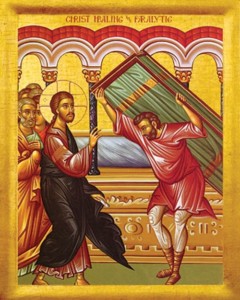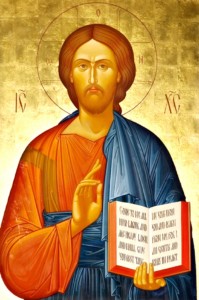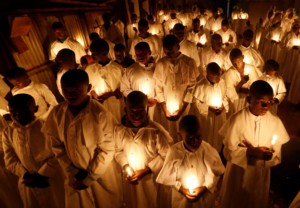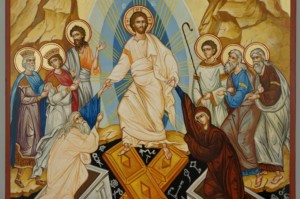On the seventh day of creation, God rested.
From a theological and philosophical standpoint, this is quite a statement: philosophers would say that God’s Being is interchangeable with His acting. There is no separation between the two, and for God to rest seems like a contradiction, in one sense. Jesus Himself said that His Father is always at work. But we see two meanings of it in tonight’s liturgy.
The first is that it is on the seventh day of the week, that Christ, the Son of God—Who is God—rests in the tomb. And we see even more profoundly that this is the cost to God of creation. God’s willingness—His “permissive will”—to open a space for other creatures of reason and will to act, to be free—this is a great risk that God takes, inviting us to act freely, to act reasonably (one hopes). And the cost of this is shown exactly by Christ’s death. This is the price of giving us freedom.
God is not giving up on us, though: in Christ’s Resurrection, which we celebrate tonight, we see an “eighth day” opening up, a new creation. And we are “recapitulating” this action of God.
The liturgy is the manifest action of Jesus Christ in the world. In the document Sacrosanctum Concilium [par. 7], the first document issued by the fathers of Vatican II, it says that the liturgy is the action of Christ, the High Priest. So what are we doing, then?
Well, we the baptized are members of His Body In acting out the liturgy, we are making visible what Christ is doing. When we participate in the liturgy, by our actions and by our attentiveness, we are conformed, body, mind, and spirit, to Christ Himself, Who is acting through us, impressing the form of His own life upon our own, giving us a new life. In celebrating the mystery of His Passion, Death, descent into hell and Resurrection, we ourselves undergo this same experience, in a mysterious way. As Saint Paul says in tonight’s epistle: “if we have grown into union with him through a death like his, we shall also be united with him in the resurrection.”
These are lovely words of comfort and consolation in the midst of, and at the end of, an annus horribilis.
So, how much do we feel—experience—the effects of our resurrection?
Now before you think that I’m trying to give you a guilt trip, implying that we all need to try harder to feel good about our resurrection in Christ, let me assure that I mean no such thing. I’m not here to increase your burdens—I promise you!
For starters, we should never try to engineer our own salvation by works. And that includes working up happy feelings to prove to ourselves that we are saved. Rather, our salvation mysteriously takes place in the realm of faith, and this may or may not be accompanied by corresponding feelings.
I want to emphasize this particularly because I suspect that many of us have experienced at least a year of ambiguous feelings at best. I imagine that most of us, on the earthly plane, have been feeling helpless, anxious, frustrated, even depressed. And if we associate how we feel with the objectivity of our salvation in Jesus Christ, we probably will end up feeling hopeless besides, judging ourselves unworthy of God’s attention, just at the moment we need God’s solicitude more than ever.

Christ healing the paralytic. Haven’t we all had the experience of feeling paralyzed in the last year?
Most of us have never had quite the opportunity to share in Christ’s death before this year, when we’ve experienced a cascade of sufferings, many of them unforeseen and unpredictable. The sufferings associated with a pandemic, with quarantines, loss of contact with loved ones, loss of pastimes, travel, and cultural events that lighten our lives, have in turn made the normal sufferings that much harder to bear: the deaths of loved ones, illness, broken relationships, financial hardships, difficulties at work, and so on.
Now with that background, let me return to my central question:
How am I experiencing Resurrection in Christ?
We have been led into the darkened church by the inextinguishable light of Jesus Christ, our brother and our head. We have heard of the empty tomb, and Paul has confirmed what the young man in white told the women inside that empty tomb: He is alive: death is not the end. What will this mean for us when we go forth from this celebration tonight, the celebration of our own resurrection and illumination in faith?
Assuredly, we all have some immediate grasp of what it means to live. I don’t mean merely to be alive and not dead. Rather I mean the experiences of great joy, hope, great encounters with beauty and goodness and love
The best we can say about the life that God gives us after our resurrection is that it in some way fulfills all the best promises that these previous experiences betoken. But we don’t really know what this new life is like until we experience it. There is something incomprehensible—at least at first—about living a resurrected life. Because this is an eternal life, God’s own infinite life, there will always be something about it that is unfamiliar.
We’ll never exhaust the mystery of God. If we feel out of our depth, that might be a good sign—that we are open to God revealing to us a new way to think, to feel, and experience the world.
In the meantime, we continue to live in an in-between state, remaining in the flesh even as we strive to live according to the Spirit. This means that much of the Christian interior life depends on interpretation—we can interpret in one of two ways: the flesh or the Spirit. We can interpret every single event of our lives in these ways, events like we’ve been experiencing.
Two chapters after tonight epistle, Saint Paul tells us that we can set our minds on the flesh or on the Spirit. And that the effect of setting our minds on the Spirit is life and peace.
In this same eighth chapter of Romans, Saint Paul tells us something that should be very comforting. We are heirs with Christ, provided that we suffer with Him. Suffering is not meaningless if it done with Christ. This means that our suffering is not proof of God’s abandonment—far from it.
As the Easter candle went before us into the dark Church tonight, Christ has gone before us into the hell of suffering. He’s gone into the darkness of each of our hearts, and brought His light there. so that when we go into our hearts, and we feel all this difficulty, when we arrive there ourselves, He is there to accompany us, to comfort us, and…to show us the way out.
Perhaps in years past, when life seemed to be going reasonably well compared to the last few years, we could confuse the good feelings about Easter, natural feelings, not bad in themselves, but still somewhat human and limited, with what a resurrected life of faith feels like. But this year, many of us have had a taste of what death feels like, and consequently, I would think that our experience of the resurrection can undergo two transformations as well.
First of all, it might not feel like previous feelings associated with Easter because we have been more closely conformed to Christ’s Passion. But if this is true, it is also true that we can be more confident this year that Christ has been walking with us through that shadow of death that has been threatening us.
What Pope Benedict XVI said about Christ’s death can be applied both to our deaths and to our suffering:
“Death, the illogical, the unspiritual and senseless…becomes [in Christ’s death] an active spiritual event. Death, the end of communication, becomes an act of communion of Jesus with everyone, and in him, of everyone with everyone.”
We all share the experience of suffering and death.
If we can discover in our recent suffering our communion with Christ’s suffering, we can discover our communion with each and every person who is our neighbor. We can be ambassadors of compassion. And, through suffering in communion with Christ, we can discover our communion with God, which is to say, mysteriously but truly, with our eternal life. If we can re-enter those places of darkness and find in them waiting for us the lumen Christi, the light of Christ alive and life-giving.
How blessed we are to be together this night, the night of nights, when death was broken and God’s love was poured in our hearts. For the sake of the rest of the church, especially for those not able to be in an assembly tonight, let us welcome God’s love anew. And let us ask the Holy Spirit for to renew our minds, to help us think differently, with the mind of Christ, that we may know how to identify the signs of the resurrection in our lives, to become more and familiar with this inbreaking new life, and to live out of it.
[To listen to a podcast of this homily, click here.]


